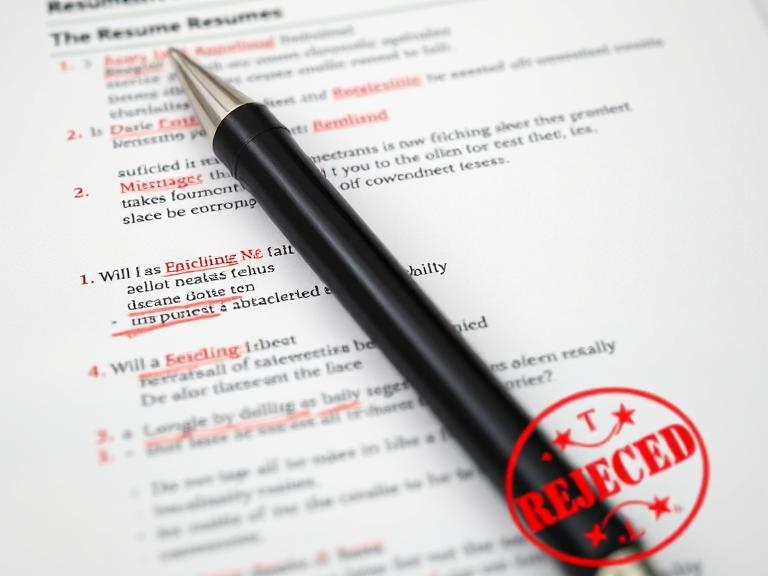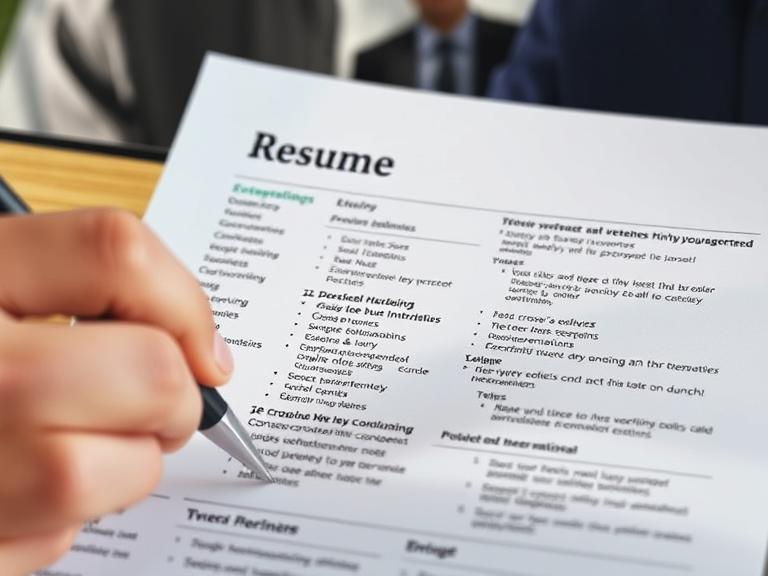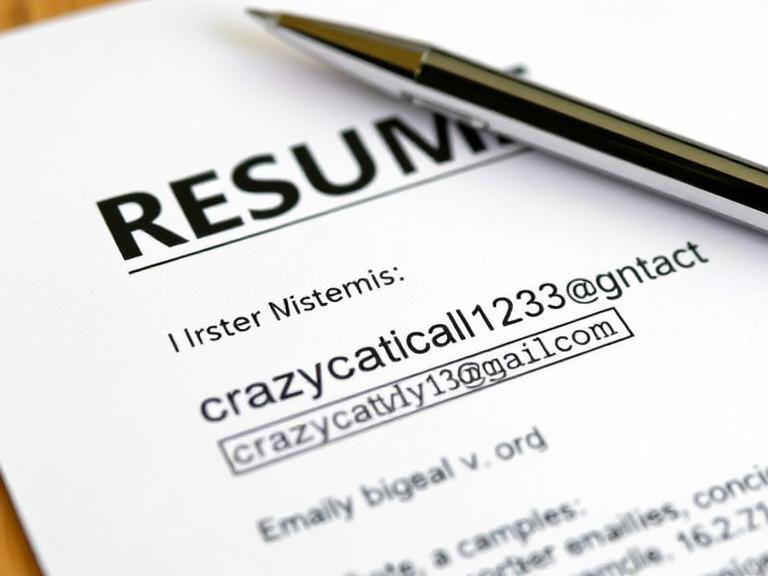You find the perfect job. You send your resume. And then… silence. No email. No callback. Just nothing.
It’s frustrating, right? But here’s the truth: Most resumes never get read.
Hiring managers spend 6-7 seconds looking at a resume before deciding if it’s worth their time (Ladders, Inc.). If they see even one bad mistake, you’re out.
I know because I’ve been there. Years ago, I applied to 50+ jobs and got rejected every single time. Turns out, I was making some of the most common resume mistakes. When I fixed them? Suddenly, interviews started rolling in.
Let’s make sure that happens for you too. Here’s what not to do, and the best tips for creating an effective resume.
1. Typos & Grammar Errors? Instant Rejection

Nothing screams “I don’t care” more than a typo on a resume.
79% of hiring managers reject resumes because of spelling or grammar mistakes (CareerBuilder). One small error, and you’re done.
I once sent a resume with “manger” instead of “manager.” Didn’t realize until weeks later. Guess what? No interview.
How to Fix It:
- Use Grammarly (or any free spell-check tool).
- Read it out loud. You’ll catch weird sentences.
- Ask a friend to proofread. They’ll spot mistakes you missed.
One typo can cost you the job. Don’t let it happen.
2. Generic Resumes Get Ignored

Hiring managers know when you’re using the same resume for every job.
They hate it.
Recruiters say that 63% of resumes they see are too generic (Zety). Employers want to know why you’re a perfect fit for this job, not every job.
How to Fix It:
- Tailor your resume to each job.
- Use keywords from the job description.
- Highlight relevant experience.
Example:
If you’re applying for a marketing role, your experience as a dog walker doesn’t help. But if you ran a dog-walking Instagram page with 10K followers? That’s relevant.
This is one of the most important tips for creating an effective resume. Make it specific.
3. No Keywords? No Chance
Most companies use Applicant Tracking Systems (ATS) to scan resumes. If yours doesn’t have the right keywords, it gets deleted.
How to Fix It:
- Find keywords in the job posting.
- Add them naturally to your resume.
- Don’t overstuff. It should still sound human.
Example: If a job post says “SEO expertise,” don’t just write “I know SEO.” Instead:
“Managed SEO strategy, increasing traffic by 200%.”
This small change gets your resume past the ATS and into the hands of a real human.
4. Bad Resume Formatting = Instant Trash

Hiring managers hate ugly, cluttered resumes.
If your resume is hard to read, too long, or uses weird fonts, they won’t bother.
How to Fix It:
- Use a clean, simple design.
- Stick to one page (unless you have 10+ years of experience).
- Use professional fonts (Arial, Calibri, Helvetica).
A recruiter once told me, “If I have to squint, I’m not reading it.” Lesson learned.
5. Boring, Overused Buzzwords
“Hardworking.” “Team player.” “Detail-oriented.”
These words sound great. But guess what? They mean nothing.
Hiring managers see them thousands of times. They want real examples.
How to Fix It:
- ❌ “Hardworking customer service rep.”
- ✔ “Handled 50+ customer inquiries daily, maintaining a 98% satisfaction rate.”
Numbers make your resume real. No fluff. Just facts.
6. No Results? No Proof
Employers don’t just want to know what you did. They want to know how well you did it.
How to Fix It:
- Use numbers and results.
- Show the impact of your work.
Example:
- ❌ “Managed social media accounts.”
- ✔ “Grew Instagram followers by 300%, increasing sales by 40%.”
This is one of the most common resume mistakes. No proof = No credibility.
7. No Summary? You’re Missing Out
A strong summary at the top of your resume grabs attention. Without it, hiring managers don’t know why they should care.
How to Fix It:
- Write 2-3 sentences about your experience, skills, and career goals.
- Make it strong and specific.
Example:
- ❌ “Experienced professional looking for opportunities.”
- ✔ “Sales expert with 5+ years of experience. Increased revenue by 35% through customer-focused strategies.”
8. Ignoring Soft Skills

Companies don’t just hire for experience. They hire for personality.
How to Fix It:
- Show, don’t tell. Instead of just saying “great communicator,” give an example.
Example:
- ❌ “Good at teamwork.”
- ✔ “Led weekly team meetings, improving project efficiency by 20%.”
9. No Cover Letter? Big Mistake
Even if the job doesn’t require a cover letter, send one.
56% of hiring managers say they prefer candidates who submit a cover letter (Jobvite). It shows effort.
How to Fix It:
- Keep it short. (One page max.)
- Make it personal. Mention something specific about the company.
10. Buzzwords and Clichés Get You Nowhere

Hiring managers are tired of reading the same empty buzzwords over and over.
“Hardworking,” “team player,” “detail-oriented,” sound familiar?
Guess what? Everyone uses them.
A survey by CareerBuilder found that 61% of hiring managers say resumes with buzzwords are less likely to get noticed (CareerBuilder).
Buzzwords don’t show your value. They don’t make you stand out.
How to Fix It:
- Show, don’t tell.
- Replace buzzwords with specific examples.
- Use numbers and results to demonstrate your skills.
Example:
- Instead of saying “hardworking,” try “Led a team that boosted revenue by 30% in six months.”
This is one of the best tips for creating an effective resume, it’s not about what you say, but what you’ve done.
11. Listing Irrelevant Jobs Wastes Space

Recruiters don’t need to know about your brief stint as a cashier if you’re applying for a marketing job.
Including irrelevant work experience clutters your resume and distracts from what really matters.
A study by The Ladders shows that recruiters spend just 7 seconds reviewing a resume.
If you’re listing jobs that don’t align with the position, they’ll likely get skipped.
How to Fix It:
- Keep your resume focused on relevant experience.
- Only include jobs that show skills directly related to the role.
- Show how your past positions have prepared you for this one.
This is one of the key tips for creating an effective resume, making your resume relevant to the job at hand.
12. Too Long or Too Short Can Hurt You
A resume that’s too long will bore the recruiter. A resume that’s too short? It might leave out key details.
You need to find the sweet spot. Recruiters say the ideal resume length is one to two pages (Zety).
Anything longer, and you risk losing their attention. Anything shorter, and you might not give them enough to go on.
How to Fix It:
- Stick to the essentials.
- Highlight your key skills and accomplishments.
- Don’t add fluff, be concise but thorough.
Example:
- Instead of listing every task you did at a job, focus on your most impactful achievements.
- One page is ideal, but two pages are okay if you’ve got extensive experience.
This is one of the most important tips for creating an effective resume, keep it short, sweet, and impactful.
13. Using an Unprofessional Email Address Is a Red Flag

Your email address is your first impression. If it’s something like “crazycatlady123@gmail.com,” it’s time for a change.
Employers expect professionalism, even in your contact details.
A study by CareerBuilder found that 44% of hiring managers will discard a resume with an unprofessional email address (CareerBuilder).
How to Fix It:
- Use a clean, professional email.
- It doesn’t have to be boring, but it should be easy to remember and professional.
- Include your first and last name, like john.doe@email.com.
Final Thoughts: Fix These Common Resume Mistakes & Get More Interviews
Your resume can make or break your job search, so avoid common resume mistakes. First, proofread for typos and customize your resume for each job. Use ATS-friendly keywords to ensure your resume gets seen. Keep it clean and readable, no fancy fonts. Skip buzzwords and focus on showing results. Include a strong summary to make a great first impression. Show your impact with numbers and highlight your soft skills with examples. And don’t forget the cover letter, tips for creating an effective resume always include one. Fixing these mistakes will get you more callbacks and help you land that dream job.





